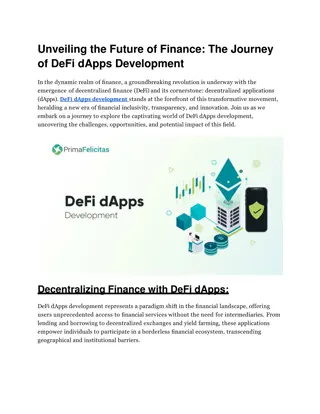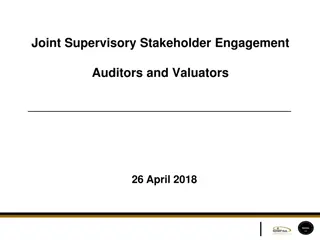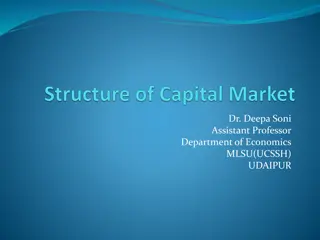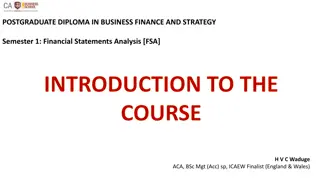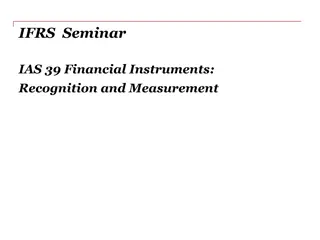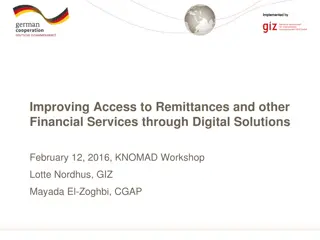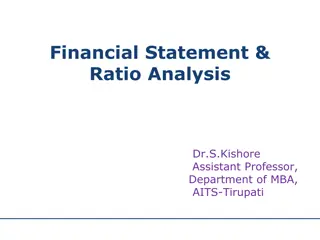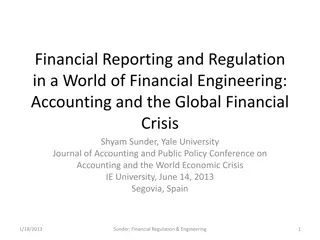Functions of SEBI: Protective, Regulatory, Development
SEBI, the Securities and Exchange Board of India, performs various functions to protect investors, regulate the market, and promote development. Its protective function includes prohibiting insider trading and price rigging, and promoting fair practices. Its regulatory function involves establishing
7 views • 5 slides
FINANCIAL INTERMEDIARIES/FINANCIAL INSTITUTIONS
Discover the different types of financial intermediaries, including the unorganized and organized sectors. Learn about the institutions that facilitate financial transactions for individuals and corporations, such as local money lenders, commercial banks, and government agencies.
3 views • 6 slides
Financial Advisor in Dubai
Do you long for peace of mind and financial security? Pro Financial Solutions is here to assist you on your journey towards a brighter financial future. As your reliable Financial Advisor in Dubai, we believe in building long-term relationships based on trust and empathy. Allow our experienced team
3 views • 3 slides
Understanding the Role of Merchant Banking in Finance
Merchant banking is a combination of banking and consultancy services that assist in various financial activities like raising finance, business expansion, and stock exchange dealings. It provides expert advice on financial, marketing, and legal matters while facilitating capital formation and moder
0 views • 52 slides
Overview of Financial Management Principles
Financial management is a vital managerial process focusing on planning and controlling financial resources. Initially centered on fund collection, modern financial management emphasizes both fund collection and efficient utilization. The characteristics of the modern approach include increased emph
1 views • 7 slides
Leveraging Finance Intermediaries for Sanitation Sector Growth
USAID's Water, Sanitation, and Hygiene Finance 2 (WASH-FIN 2) aims to mobilize $375 million by 2027 for climate-resilient water and sanitation services in Kenya, India, and Ghana. The project focuses on strengthening governance, improving service provider performance, and expanding partnerships. Tec
1 views • 12 slides
Financial Oversight and Corrective Actions in Transit Administration
Financial oversight and corrective actions play a crucial role in ensuring compliance and efficiency in transit administration. The Federal Transit Administration (FTA) Region 9's Office of Financial Management and Program Oversight works diligently to identify common deficiencies through triennial
0 views • 28 slides
Revolutionizing Finance: The Rise of DeFi dApps Development
DeFi dApps Development encapsulates the creation and advancement of dApps within the realm of DeFi. These applications leverage blockchain technology to offer a wide array of financial services, such as lending, borrowing, trading, and asset management, without reliance on traditional intermediaries
5 views • 3 slides
National Financial Education Strategies and Best Practices
Financial education plays a crucial role in empowering individuals and ensuring financial system stability globally. The National Strategies for Financial Education (NFES) endorsed by the G20 have been adopted by approximately 100 countries. Different approaches such as stand-alone strategies, multi
5 views • 34 slides
How to achieve financial freedom in 5 years
Welcome to the Financial Freedom Challenge!\nAre you ready to take control of your financial future and unlock the door to lasting prosperity? Join us on a journey toward financial freedom like no other.\nWhat is the Financial Freedom Challenge?\nThe Financial Freedom Challenge is a transformative p
0 views • 9 slides
SEBI's Role in Investor Protection and Stock Market Regulation
Securities and Exchange Board of India (SEBI) plays a crucial role in safeguarding investor interests and ensuring fair practices in the Indian stock market. By promoting transparency, enforcing regulations, and regulating market intermediaries, SEBI aims to maintain market integrity, protect invest
0 views • 23 slides
Understanding Financial Leverage and Its Implications
Financial leverage refers to a firm's ability to use fixed financial costs to amplify the impact of changes in earnings before interest and tax on its earnings per share. It involves concepts like EBIT, EBT, preference dividends, and tax rates, and can be measured through the degree of financial lev
1 views • 7 slides
Financial Empowerment through the Allstate Foundation Curriculum
Explore the Allstate Foundation's Moving Ahead Curriculum on financial empowerment, focusing on Module 4 that covers building financial foundations, loan options, and organizing financial paperwork. Understand the importance of loans, documentation, and financial records for establishing a strong fi
0 views • 25 slides
A Primer on Financial Ratio Analysis and CAHMPAS
This resource by the CAHMPAS Financial Team at University of North Carolina provides an in-depth look into financial ratio analysis, including the theory, types of analyses, and the importance of understanding financial indicators. It discusses how businesses can assess their financial performance a
0 views • 87 slides
Functions of Commercial Banks
Commercial banks perform primary functions like accepting deposits, offering various deposit accounts, advancing loans for productive purposes, creating credit by circulating demand deposits, and providing indirect credit to governments. They serve as important financial intermediaries in the econom
0 views • 6 slides
Understanding the Financial System: A Comprehensive Overview
The financial system plays a vital role in any economy by facilitating the flow of funds between surplus and deficit units through financial markets and intermediaries. This system involves the mobilization of savings, investments, and credit allocation, ultimately supporting economic development. L
0 views • 37 slides
Albanian National Financial Education Strategy 2022-2027
The Albanian National Financial Education Strategy (NFES) aims to promote financial education for individuals, households, and MSMEs to enhance financial well-being and economic stability. It focuses on key interventions, foundational enablers, institutional coordination, funding, and monitoring. Fi
0 views • 19 slides
NAMFISA Organisational Restructuring and Regulatory Overview
NAMFISA, established under the NAMFISA Act of 2001, exercises supervision over financial institutions and services in Namibia. The organization recently underwent an organizational restructuring to optimize resources and enhance efficiency. They oversee a broad regulatory scope covering various fina
0 views • 25 slides
Overview of Indian Capital Market and Financial Institutions
The Indian Capital Market comprises securities market and financial institutions, facilitating the trading of government securities, industrial securities, and providing medium to long-term funds. Financial intermediaries like merchant bankers, mutual funds, and venture capital companies contribute
0 views • 5 slides
Understanding Financial Statements Analysis in Business Finance
Understanding the analysis of financial statements is crucial for assessing the financial performance and position of an organization. This course provides knowledge, competencies, and skills necessary to apply basic financial statement analysis techniques, interpret financial numbers, and generate
0 views • 18 slides
Understanding IAS 39: Financial Instruments Recognition and Measurement
This content provides an overview of an IFRS seminar on IAS 39, focusing on key concepts such as the classification and measurement of financial assets, impairment, reclassification, and more. It covers definitions of financial instruments, financial assets, equity instruments, and financial liabili
1 views • 43 slides
Understanding Tourism Distribution and Commission in Small Business Marketing
Explore the significance of tourism distribution and commission in small business marketing, including the role of travel trade intermediaries, impact on pricing and competitiveness, and preferred supplier agreements. Learn about the cost of getting a sale, commission levels, and the influence of in
0 views • 20 slides
Enhancing Financial Inclusion Through Digital Solutions
This project, implemented by GIZ with funding from the German Federal Ministry for Economic Cooperation and Development, aims to improve access to digital payments and financial services for refugees and low-income Jordanians. Key objectives include increasing the usage of digital financial services
0 views • 11 slides
Understanding Financial Abuse and Building Healthy Financial Relationships
Explore the impacts of financial abuse within relationships and learn about elements of a healthy financial partnership. Gain insights into recognizing signs of financial abuse, establishing financial safety, and fostering equality in decision-making. Understand how financial empowerment plays a vit
0 views • 30 slides
St. John's College Cambridge Annual Financial Review 2015/16 - Summary and Analysis
This confidential Annual Financial Review for the Fellows of St. John's College, Cambridge provides detailed insights into the financial performance and outlook for the year 2015/16. It covers the income, expenditure, endowment, and school finances of the College group. The review discusses the oper
0 views • 35 slides
Climate Finance as a Catalyst for Private Sector Financing in Latin America
Climate finance plays a vital role in leveraging private sector financing for energy projects in Latin America. Public and private sources, along with intermediaries, contribute to a significant portion of climate finance flows. Examples include ministries, government agencies, development banks, an
0 views • 17 slides
Dutch Good Growth Fund: Financing for Development
Dutch Good Growth Fund (DGGF) is a €700 million revolving fund that provides tailored funding for sustainable and socially responsible small and medium-sized enterprises (SMEs) in low- and middle-income countries. It aims to address the financing challenges faced by SMEs, offering various financia
0 views • 9 slides
Exploring the Wealth Market Opportunities for Mortgage Intermediaries
Delve into the world of lending in the wealth market with a focus on the 1m plus market, Coutts proposition, and business development support available specifically for mortgage intermediaries. Learn about the market trends, distribution insights, and the range of products offered. Discover the proc
0 views • 12 slides
Small Contractors Bonding and Business Planning Initiative
Small Contractors Initiative focuses on providing bonding and access to capital for small businesses. The course covers topics such as bonding basics, business planning, financial management, working capital, and contracting opportunities. Participants will learn the importance of bonds, the history
0 views • 35 slides
Livestock Economics and Marketing: Market Information and Institutional Approach
Market information plays a crucial role in livestock economics and marketing by providing essential knowledge on prices, quantities, and stocks, aiding decision-making for farmers and market intermediaries. It encompasses market news and market intelligence. The collection of market information is d
0 views • 11 slides
Financial Literacy Empowerment in Eastern and Southern Africa
Developing countries in Eastern and Southern Africa are prioritizing financial education to empower consumers in making sound financial decisions. Financial literacy enhances financial inclusion, stability, and economic growth. It involves awareness, knowledge, skills, attitudes, and behaviors essen
0 views • 23 slides
Understanding Why Financial Institutions Exist
Financial institutions exist to provide crucial services like intermediation, risk management, and facilitating economic activities by connecting savers and borrowers. The global financial structure involves various institutions like banks, insurance companies, and securities markets. Key facts incl
0 views • 45 slides
Understanding Financial Statement and Ratio Analysis
This informative content discusses the importance of financial statement and ratio analysis in assessing a firm's past, present, and future financial conditions. It covers the primary tools used, such as financial statements and comparison of financial ratios, as well as the objectives of ratio anal
0 views • 35 slides
Role and Functions of SEBI in Financial Market Regulation
SEBI, the Securities and Exchange Board of India, plays a crucial role in protecting investor interests and ensuring fair practices in the financial market. It carries out protective functions by preventing insider trading and price rigging, promotes fair trade practices, and provides financial educ
0 views • 5 slides
Financial Literacy and Education Commission: Coordinating Federal Efforts
Financial capability empowers individuals to manage financial resources effectively, make informed choices, avoid pitfalls, and improve their financial well-being. The Financial Literacy and Education Commission (FLEC) works to improve the financial literacy of individuals in the United States throu
0 views • 16 slides
Challenges in Financial Reporting and Regulation amidst Financial Engineering
Efforts to establish effective regulatory standards in accounting and financial services have often fallen short in the face of financial engineering advancements. This article explores the reasons behind these failures, including the inability of regulations to keep up with innovative financial pra
0 views • 65 slides
Understanding Channels of Distribution in Business
Channels of Distribution play a crucial role in the movement of goods and services from manufacturers to end consumers. This involves the allocation and transfer of products through various intermediaries, impacting sales and availability. The types of channels include Direct, Indirect, and Hybrid c
0 views • 20 slides
Evolution of State Banking in 19th Century America
American economic development in the 19th century was driven by the abundance of resources and the necessity for capital-intensive projects. The expansion of the economy, adoption of technology, and integration into a national economy required a robust financial system with financial intermediaries
0 views • 19 slides
Understanding Financial Markets: Mechanisms and Efficiency
Financial markets play a crucial role in connecting borrowers and lenders, facilitating the flow of funds for optimal allocation. Different financial phases involve borrowing, saving, and investing. Transfers of funds occur directly or through intermediaries. Efficiency in financial markets ensures
0 views • 15 slides
Understanding Financial Literacy and Its Importance
Financial literacy is crucial in today's society as it involves knowledge of financial concepts, skills to make effective decisions, and confidence in financial matters. This module explores the definition of financial literacy, its importance for young people, and the impact of financial literacy a
0 views • 20 slides







